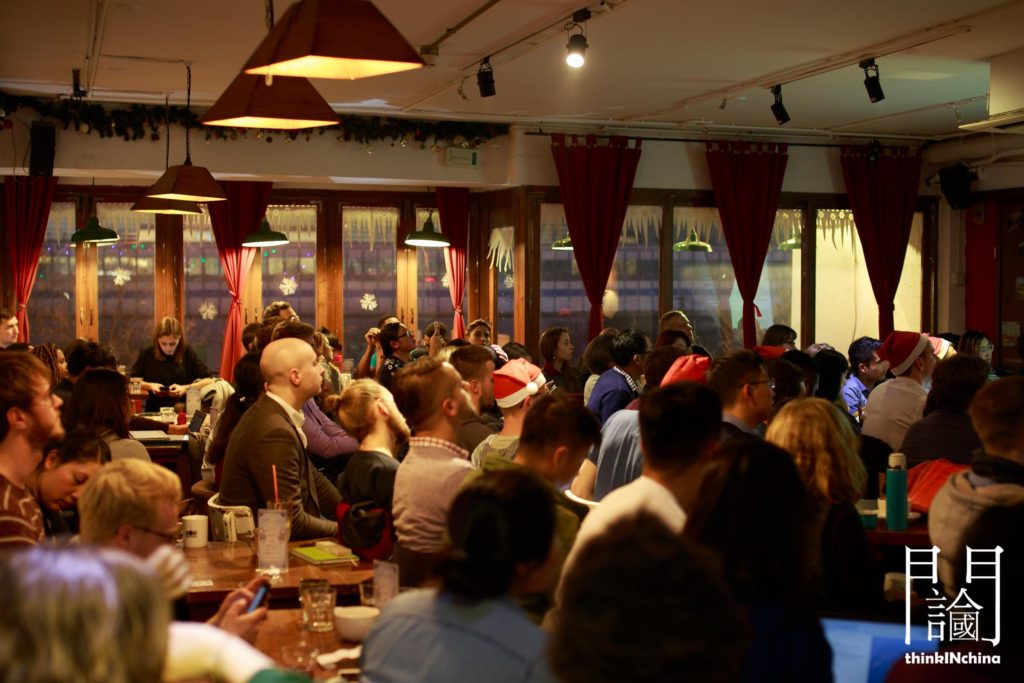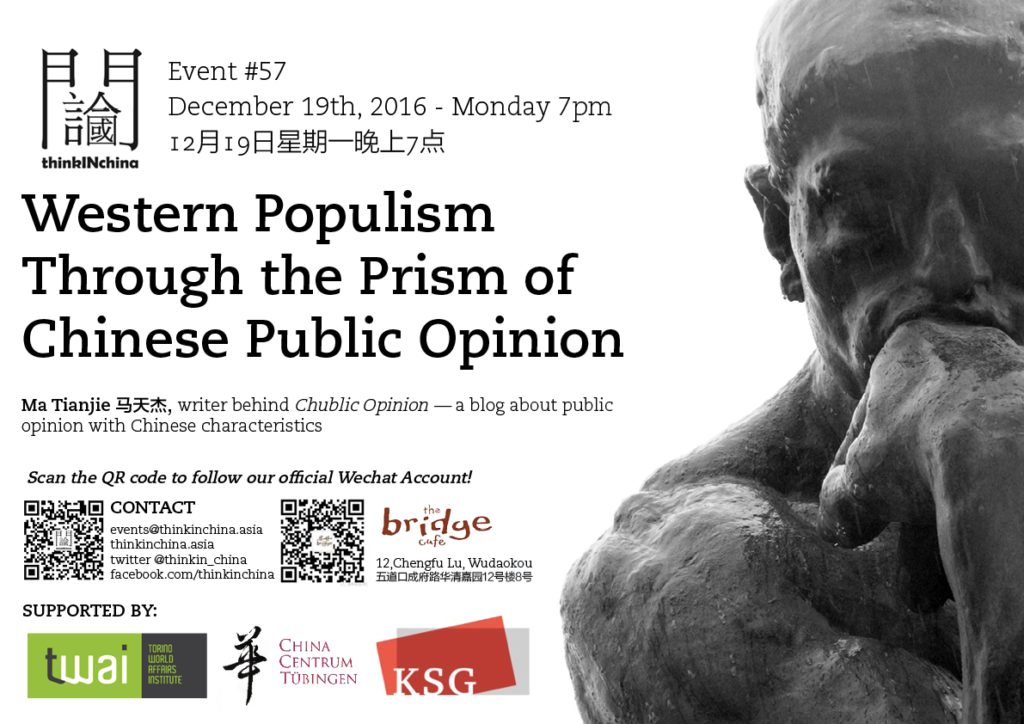-
09 Feb
-
03 Jan
#57 Event Report – Western Populism Through the Prism of Chinese Public Opinion
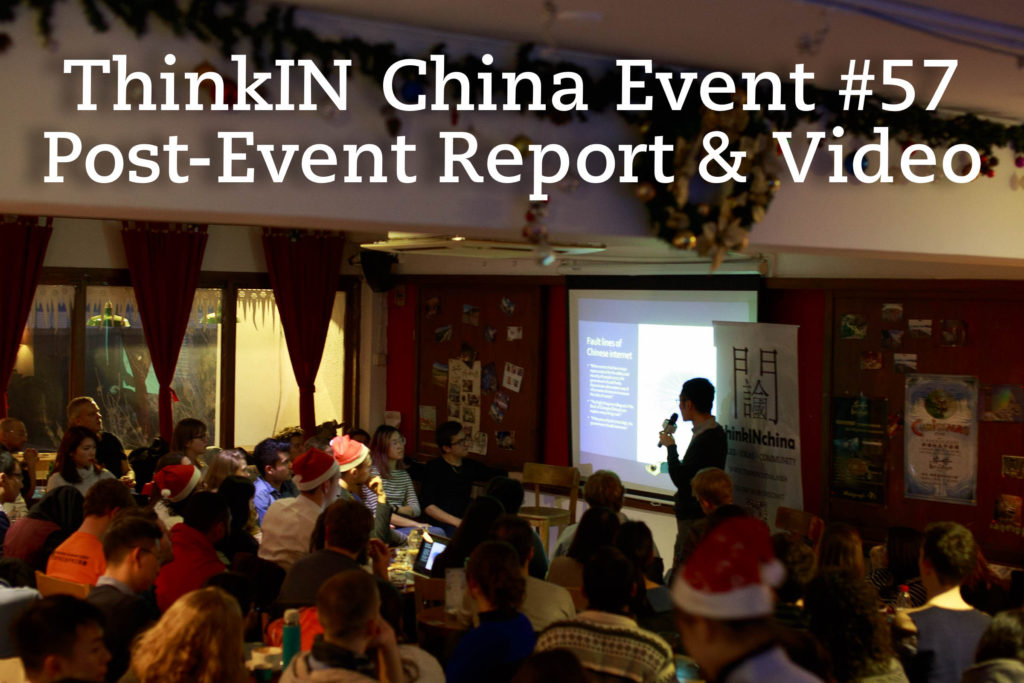
#57 Event Report – Western Populism Through the Prism of Chinese Public OpinionSpeaker
Ma Tianjie 马天杰 writer behind Chublic Opinion — a blog about public opinion with Chinese characteristics.Post-Event Video
(If this section is blank, make sure you’ve turned on your VPN)Report
Monday, December 19th, TIC’s community gathered in a festive Bridge Café for the season’s grand finale, followed by a vibrant afterparty accompanied by the jazz notes of Yenchinger Sudarshana Chanda and her band. As Christmas approached and an exciting season came to an end, intellectual enthusiasm and curiosity still animated Wudaokou’s students and researchers. Indeed, 2016 has been a complex (albeit fascinating) year in western politics to observe: Brexit, the election of President Trump, and the rise of populist political movements in Europe have forced us to examine critically and to reflect thoughtfully on the nature of populism. Analyzing these issues within a Chinese context was the topic of our final IN-Talk, which was successfully held at Renmin University. More specifically, we explored how the Chinese public observes and debates changes in the West. TIC was especially thrilled to host Ma Tianjie, whose Chublic Opinion blog provides English-language insights on the complex universe of Chinese social media, online debates, and public opinion’s stirrers and shapers.The elephant curve: the losers of globalization and Trumps’ victory
Ma is not a self-proclaimed expert of Western populism; he is, however, a passionate researcher who appreciates the importance of understanding how the rise of Weibo, Wechat, Zhihu and other platforms revolutionized information access and political discourse in the Chinese cyberspace. The first question Ma addressed is why well-educated Chinese netizens seem to be fond of Donald Trump. Ma started his presentation by introducing the “elephant curve,” a world-famous graph used to explain the backlash against globalization. The graph depicts which segments of the global population saw a rise in their real incomes from 1988 to 2008: together with the poorest group, white working classes in the Western world happened to be among the biggest “losers” of globalization. These people appreciated Trump for voicing their anger.But the real question is why winners of globalization like the Chinese middle class, who saw a dramatic rise in their living standards, exulted at the election of a man who harshly attacked China and criticized a system that enabled China to develop?
China’s “political compass” and the rise of opinion leaders
The explanation, for Ma, can be found in China’s value system. The theoretical framework of China’s “political compass,” developed by some students at Peking University, can help situate dominant social values in China, which are reflected by the online community and in public opinion research. PKU’s “political compass” is a tridimensional framework that categorizes political ideologies based on the respondents’ views on state control (politics), traditional values and norms (culture), and the market’s role in resource distribution (economy). Based on the results of the anonymous online self-assessment tool, some political scientists mapped China’s ideological spectrum by looking at patterns in the responses. In the era of big data, this ideological spectrum is amazingly reflected and visualized in graphic representations of clusters and flows of ideas taken from online discussions; this intricate net of posts, comments, and retweets shows how opinions interact, connect, and compete with each other.
With the emergence of social media platforms, opinion leaders have become important shapers of online discussions, posting “articulated but relatively predictable views on a wide range of issues that shape the landscape of ideas.” These pundits rise and fall, so do their ideas: on Weibo, more diverse opinions have recently replaced mainstream liberal, pro-market voices. Ma showed a map of recent trends in Chinese public opinion by tracking dominant debates on the web. In a closely monitored society, social media have become a useful tool to understand what people think.Key events and debates in the Chinese cyberspace: the refugee crisis and Donald Trump
A single online post and the public’s reactions to it can reveal how the Chinese public sees key events in China and abroad. Ma studied four debates that shook social media: the refugee crisis in Europe, public attitudes toward the poor, the public’s judgment of celebrities committing adultery, and Donald Trump’s election. The first and the last issues stimulated vibrant debate during the Q&A session. A liberal post about Germany’s embracing of Syrian refugees attracted divergent opinions, from humanitarianism to concerns for rising crime rates and cultural clashes in European societies.These views embody the tension between conflicting values: national stability versus individual welfare, personal achievement versus social support, social homogeneity versus diversity, tolerance, and inclusiveness.
Imaging these pairs as being polar opposites, where does Chinese public opinion lie on the spectrum? Research suggests that the Chinese public prefers conservative values over liberal ones; indeed, this may help explain enthusiasm for Trump in China. Chinese netizens identify Trump as a self-made man (personal achiever) who values stability and homogeneity (reflected in his immigration policy) and traditional family values (as opposed to LGBT rights).
The extent to which these online opinions impact Chinese society as a whole, reflect China’s view of the West, and influence policy makers, merits further research:
Has China become populist, conservative, and/or nationalistic? Or is it simply looking for entertainment?
How does the government respond to online debates? Do these debates impact Sino-US relations? What we can be confident in saying is that today, China watchers cannot neglect the role of social media.
Report by Rebecca Arcesati
Related Posts
- 10000
  ; Speaker Ma Tianjie 马天杰, writer behind Chublic Opinion — a blog about public opinion with Chinese characteristics When Date: Monday, December 19th Time: 7:00PM (arrive early to secure a seat) Location: The Bridge Cafe, Wudaokou Abstract The election of Donald Trump as President of the United States…
 ; Speaker Ma Tianjie 马天杰, writer behind Chublic Opinion — a blog about public opinion with Chinese characteristics When Date: Monday, December 19th Time: 7:00PM (arrive early to secure a seat) Location: The Bridge Cafe, Wudaokou Abstract The election of Donald Trump as President of the United States… - 10000
 Ma Tianjie 马天杰, writer behind Chublic Opinion — a blog about public opinion with Chinese characteristics. Ma Tianjie is the writer behind Chublic Opinion, a blog offering rich and fascinating insights into Chinese public opinion. Ma surveys the turbulent seas of Chinese social media and news, delving…
Ma Tianjie 马天杰, writer behind Chublic Opinion — a blog about public opinion with Chinese characteristics. Ma Tianjie is the writer behind Chublic Opinion, a blog offering rich and fascinating insights into Chinese public opinion. Ma surveys the turbulent seas of Chinese social media and news, delving… - 10000
Read more... -
05 Dec
Ma Tianjie
Ma Tianjie 马天杰, writer behind Chublic Opinion — a blog about public opinion with Chinese characteristics.
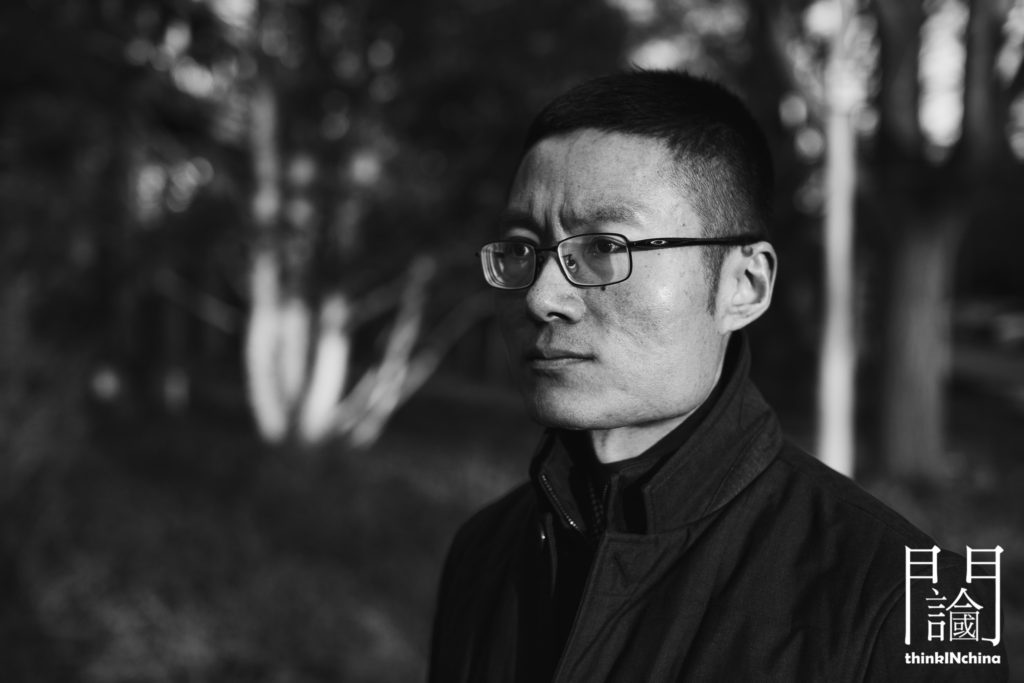
Ma Tianjie is the writer behind Chublic Opinion, a blog offering rich and fascinating insights into Chinese public opinion. Ma surveys the turbulent seas of Chinese social media and news, delving below the surface to try and understand who is shaping Chinese public opinion, how and why.
The Shanghai born Ma studied English language and literature at Peking University, where he honed the impressive writing talent he displays today. It was here he became involved with the Vegetarian Society of Peking University, an encounter that led to a career in environmental protection.
Ma began working for Greenpeace upon graduating in 2004 and was eventually elevated to Greenpeace’s Program Director for Mainland China. While at Greenpeace, he was a regular commentator on China’s environmental challenges contributing to a range of media organisations.
Ma holds a Master’s Degree in environmental policy from American University, Washington D.C. and is now Managing Editor in Beijing for bilingual environmental website China Dialogue,an independent organisation dedicated to promoting a common understanding of China’s urgent environmental challenges.
Ma is also a regular guest of the Sinica Podcast.
Read more... -
05 Dec
#57 – Western Populism Through the Prism of Chinese Public Opinion
 ;
Speaker
Ma Tianjie 马天杰, writer behind Chublic Opinion — a blog about public opinion with Chinese characteristicsWhen
Date: Monday, December 19th
Time: 7:00PM (arrive early to secure a seat)
Location: The Bridge Cafe, WudaokouAbstract
The election of Donald Trump as President of the United States is not only a watershed event in American politics. It also stirs up intensive debates in the Chinese cyberspace, exposing fault lines that run deep in online communities today.Why would educated and intellectually curious Chinese netizens find Donald Trump appealing to them?
Why do people sitting in comfortable apartments in Beijing become so agitated by Europe’s embracing of Syrian refugees? And why would a society that has barely lifted itself from poverty become so impatient with liberal ideas of taking care of the poor?
To answer these questions, one needs to understand who is influencing Chinese public opinions on these issues, what has shaped the public’s views over time and why certain ideas “stick” while others don’t.
The emergence of social media platforms such as Weibo and WeChat in recent years have revolutionized the political discourse in China.
The once one-way-street of information dissemination from the state has become a crowded and noisy street market of competing ideas.
As much as these platforms “democratize” the online space, they also shatter longtime “consensuses” and realign social values, for better or for worse. The implications of this new landscape for social governance, policy making and international relationships merit exploration.
On December 19th, join us at the Bridge Cafe in Wudaokou to hear Ma Tianjie explore some of the aforementioned themes based on his observation of Chinese online debates in the past few years.
Related Posts
- 10000
 Ma Tianjie 马天杰, writer behind Chublic Opinion — a blog about public opinion with Chinese characteristics. Ma Tianjie is the writer behind Chublic Opinion, a blog offering rich and fascinating insights into Chinese public opinion. Ma surveys the turbulent seas of Chinese social media and news, delving…
Ma Tianjie 马天杰, writer behind Chublic Opinion — a blog about public opinion with Chinese characteristics. Ma Tianjie is the writer behind Chublic Opinion, a blog offering rich and fascinating insights into Chinese public opinion. Ma surveys the turbulent seas of Chinese social media and news, delving… - 10000
- 10000
 #57 Event Report - Western Populism Through the Prism of Chinese Public Opinion Speaker Ma Tianjie 马天杰 writer behind Chublic Opinion — a blog about public opinion with Chinese characteristics. Post-Event Video (If this section is blank, make sure you've turned on your VPN) Report Monday, December 19th,…
#57 Event Report - Western Populism Through the Prism of Chinese Public Opinion Speaker Ma Tianjie 马天杰 writer behind Chublic Opinion — a blog about public opinion with Chinese characteristics. Post-Event Video (If this section is blank, make sure you've turned on your VPN) Report Monday, December 19th,…
Read more... -
05 Dec
#57 – Reading List
Chublic Opinion – we highly recommend Ma Tianjie’s blog
Q&A with Ma Tianjie at SUP China – further background on Ma
Listen to what Ma had to say on the Sinica Podcast:
Lines of fracture in Chinese public opinion: A conversation with Ma Tianjie
Public opinion with Chinese characteristics
Read more... -
26 Nov
#56 Event Report – China’s Maritime Road & the New Centrality of the Mediterranean
#56 Event Report – China’s Maritime Road & the New Centrality of the Mediterranean
Speakers
Massimo Deandreis General Manager of SRM – Economic Research Center Intesa Sanpaolo Group
Wang Lin 王琳 Fellow at CBN research Institute, a think tank on foreign affairs, international finance and global energy.Post-Event Video
(If this section is blank, make sure you’ve turned on your VPN)Report
Only three weeks after event #55, thinkINchina (TIC) gathered again for what promised to be another thought-provoking evening. With both the Yenching and Schwarzman scholars out of town, TIC was especially honored to still host over a hundred young scholars at Wudaokou’s Bridge Café. And worth attending the evening was. The two speakers explored the central role of Mare Nostrum in China’s massive One Belt, One Road project in great detail – yet without losing grasp of the bigger picture. All the way from Italy came Massimo Deandreis to shed light on developments in the global maritime economy, which had presented both the Mediterranean and China with many new opportunities. From closer to TIC’s home came Wang Lin, who provided us with a better understanding of what One Belt, One Road actually is, and specific cases of port building in Pakistan.
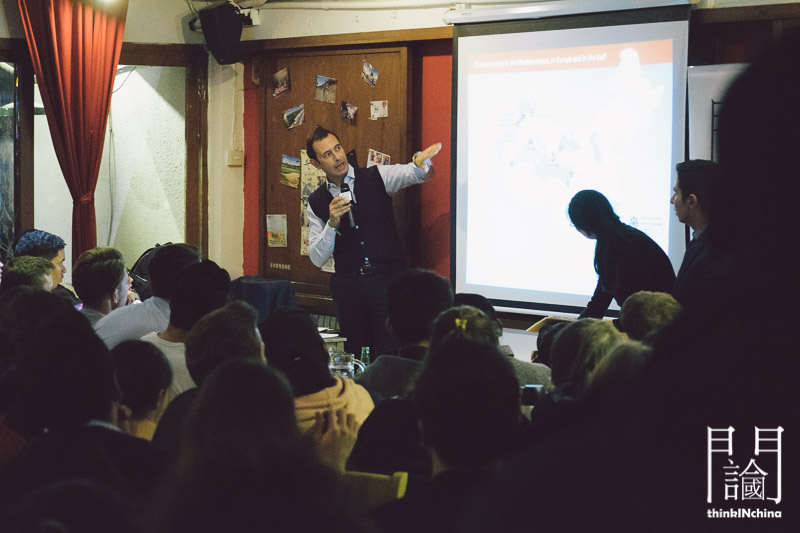
Massimo Deandreis started us off by stressing the intensification of Middle Eastern, North African, and European commercial relations with China of the last couple of decades.
Trade between China and Europe is booming – increasing from 79 billion euros in 2001 to 473 billion last year
Simultaneously, Chinese trade with the MENA region grew more than tenfold, as China decisively overtook the US as MENA’s number one trading partner in 2012. Together, Europe and the MENA region were good for a staggering 625 billion euros of Chinese trade in 2015 amounting to 6.2 percent of China’s total GDP.
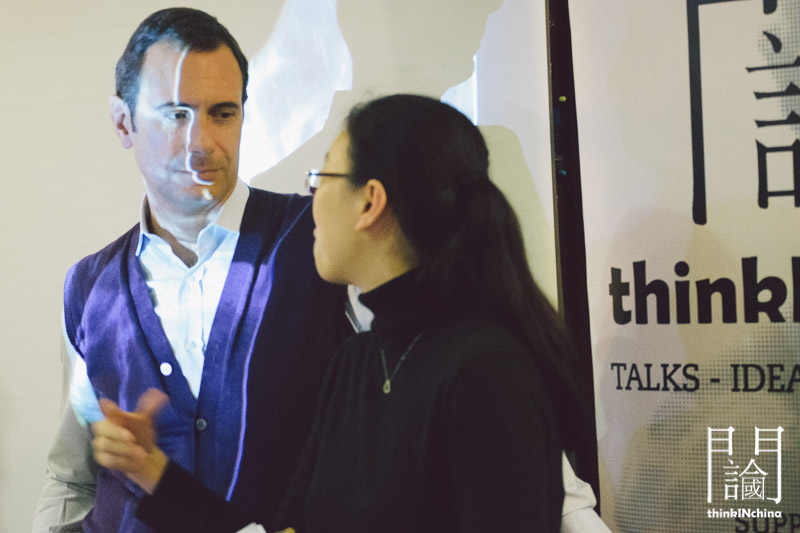
Now why is this relevant for the Mediterranean? Because globally 80 percent of trade is carried by sea and handled by ports bordering said sea. The megaships carrying the gigantic amount of Chinese goods to Europe and MENA do so almost exclusively through the Suez Canal leading them right into Mare Nostrum. Moreover, Mediterranean ports are gaining ground vis-à-vis their Northern European counterparts, as they have successfully increased their market share from 27 percent (in 2008) to 34 percent (in 2015). This allows the region to enjoy an even bigger piece of a cake that grows larger every year.According to Deandreis, there are four major phenomena currently influencing the global maritime economy. The New Suez Canal has effectively doubled the capacity of its previous version. The canal nowadays allows 97 ships to pass through each day whereas only 47 could in the past.
The building of even larger megaships has also transformed maritime trade.
Whereas ships were maximally able to carry 4.500 containers (TUEs) back in the 1970s, the newest megaship will be able to carry over 22.000TUEs. Interestingly enough, the New Panama Canal, inaugurated in 2016, can only entertain ships carrying up to 13.200TUEs whereas the newest megaships are indeed able to pass through the New Suez Canal. Although the New Panama Canal constitutes a significant improvement of the former version, the Suez route has relatively gained ground. Moreover, China has intended to cash in on Suez’s new possibilities by having its shipping company Cosco Shipping forming a block with French, Taiwanese and Hong Kong competitors under the name the Ocean Alliance. Today this alliance is responsible for 35 percent of all Asian-European and 40 percent of Trans-Pacific maritime trade.

Deandreis therefore concluded that China is a key player in all four phenomena currently reshaping the maritime economy, and on top of that has a growing geo-economic role in the Mediterranean coherent with China’s One Belt, One Road project. Furthermore Deandreis reminded the attendees that it is indeed reasonable to think that shipping companies will exploit sea-routes that assure multiple stops to unload containers and load others, and that companies intend to use the largest, and most cost-efficient vessels to ship goods. The Suez route is the only route with such stops and the new Suez Canal is the only canal that these huge vessels can pass through. It is for these reasons that the Mare Nostrum region is perfectly positioned to reap many of the fruits the One Belt, One Road project will bring to Europe.Then Wang Lin, a researcher and journalist who had joined Xi Jinping on the Pakistan trip during which he announced the 46 billion dollar investment package in the country, took the floor. She stressed the sheer magnitude of the One Belt, One Road initiative pointing out that,
ports spreading from Pakistan, to Sri Lanka, to Southeast Asia, and all the way up to Israel and Egypt have been constructed with Chinese engagement.
Whereas Chinese companies like China Harbor, China Shipping Company and China Operations Company initially used to just function as contractors, they nowadays actively invest in foreign ports. Indeed, they intend to become joint operators or even owners of these harbors. They do so however, by offering a wide range of different partnerships that will ensure that the sovereignty of the host state is respected. Lin stressed that China’s state owned enterprises do not go out as part of big brother’s (Beijing’s) geopolitical strategy, but instead are mostly driven by their own commercial interests. Fears of future meddling in internal affairs by Beijing through these ports, Lin argued, are therefore unfounded.
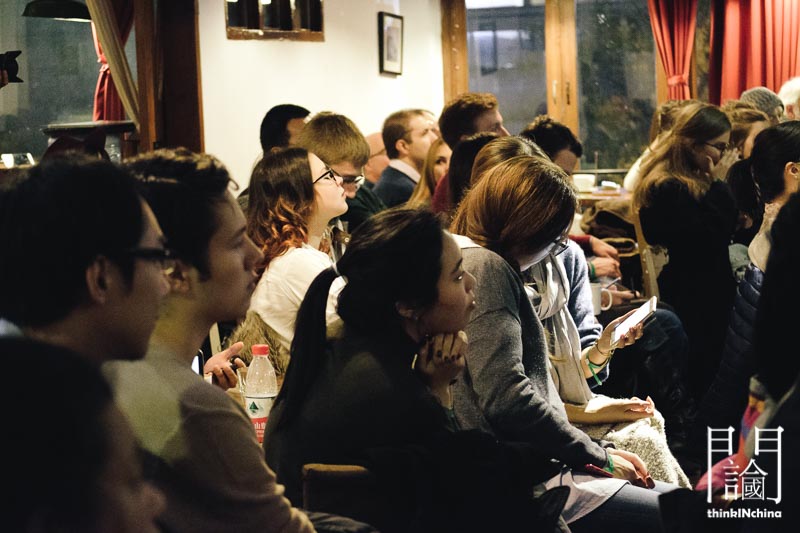
Lin proceeded by further stressing the altruistic character of the One Belt, One Road initiative. She supported her argument by pointing out China’s flagship project the 46 billion dollar China Pakistan Economic Corridor. Through Chinese financial support the otherwise dead-in-the-water Gwadar port project was rendered economically feasible. Today it only takes trucks 15 days to drive from Xinjiang to this harbor. Pakistan can because of this project now be included in the Maritime road. Through its state owned companies extending more and more credit, China is expected to enable an increasing amount of projects to come off the ground. Hereby connecting more and more countries to its One Belt, One Road initiative in the near future.Joris Jaap Teer
Related Posts
- 10000
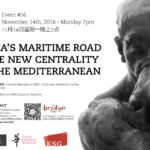 event #56, Monday, November 14th, 2016 SPEAKERS Massimo DEANDREIS, General Manager of SRM - Economic Research Center, Intesa Sanpaolo Group WANG Lin 王琳, Fellow at China Business News Research Institute ABSTRACT This talk will explore China’s growing role in the Mediterranean and its potential impact on maritime geo-economics. Beginning with…
event #56, Monday, November 14th, 2016 SPEAKERS Massimo DEANDREIS, General Manager of SRM - Economic Research Center, Intesa Sanpaolo Group WANG Lin 王琳, Fellow at China Business News Research Institute ABSTRACT This talk will explore China’s growing role in the Mediterranean and its potential impact on maritime geo-economics. Beginning with… - 10000
 Massimo DEANDREIS, General Manager of SRM - Economic Research Center, Intesa Sanpaolo Group Mr. Deandreis graduated with a degree in International Economic Law from the University of Turin in 1991. He then attended a postgraduate course in International Relations and was awarded a scholarship assigned by the Italian Ministry of Foreign…
Massimo DEANDREIS, General Manager of SRM - Economic Research Center, Intesa Sanpaolo Group Mr. Deandreis graduated with a degree in International Economic Law from the University of Turin in 1991. He then attended a postgraduate course in International Relations and was awarded a scholarship assigned by the Italian Ministry of Foreign… - 10000
Read more... -
16 Nov
INTalks #1: Contemporary Challenges to Sino-Japanese Relations
Monday, 17th October 2016
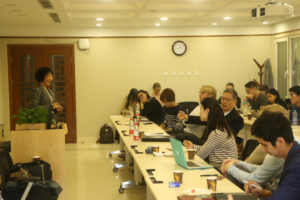
Speakers
Professor Janet Xuanli Liao, Senior Lecturer in Energy and Climate Diplomacy at the Centre for Energy, Petroleum and Mineral Law and Policy (CEPMLP), University of Dundee.
Professor He Yafei, a senior Chinese diplomat and currently Professor at the Benching Academy
ThinkIN China, in partnership with the Yenching Academy of Peking University, hosted a workshop to debate one of the most important bilateral relations in today’s world – that between China and Japan – two major players in the international arena and key actors in the East Asian region.
The event saw the participation of two renowned guests. The workshop started with a lecture by Professor Janet Xuanli Liao, Senior Lecturer in Energy and Climate Diplomacy at the Centre for Energy, Petroleum and Mineral Law and Policy (CEPMLP), University of Dundee. Professor Liao obtained a Ph.D in International Relations from the University of Hong Kong, an MA in International Relations at the University of Japan, and holds a BA and MA in History from Peking University. Her current research interests include Chinese think tanks and China’s foreign policy-making, Sino-Japanese political/energy relations, China’s Energy diplomacy, Chinese NOC’s and government relationship, and China and Japan’s climate change policy. She held several teaching and research positions in China, Japan, UK and Sweden.
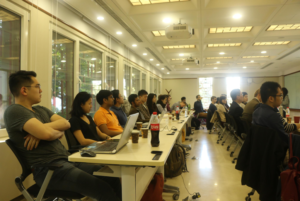
After the lecture, Professor He Yafei, a senior Chinese diplomat and currently Professor at the Yenching Academy, opened the discussion by sharing his views on the current state and future prospects of the bilateral relation, drawing on his extensive knowledge and first-hand experience as a diplomat. During his career, Professor He worked in the Secretariat of the United Nations in New York City, the PRC’s embassy in the United States of America, served as Assistant Foreign Minister and then Vice Minister of Foreign Affairs, held the positions of Ambassador of China in the U.N. Offices in Geneva and Deputy Director of Overseas Chinese Affairs Office of the State Council. Several Yenching scholars joined the discussion and had the opportunity to engage in fruitful debate with the two guests, in an informal and stimulating environment.
Read more... -
14 Nov
Podcast #56 – CHINA’S MARITIME ROAD & THE NEW CENTRALITY OF THE MEDITERRANEAN
Podcast
Related Posts
- 10000
 event #56, Monday, November 14th, 2016 SPEAKERS Massimo DEANDREIS, General Manager of SRM - Economic Research Center, Intesa Sanpaolo Group WANG Lin 王琳, Fellow at China Business News Research Institute ABSTRACT This talk will explore China’s growing role in the Mediterranean and its potential impact on maritime geo-economics. Beginning with…
event #56, Monday, November 14th, 2016 SPEAKERS Massimo DEANDREIS, General Manager of SRM - Economic Research Center, Intesa Sanpaolo Group WANG Lin 王琳, Fellow at China Business News Research Institute ABSTRACT This talk will explore China’s growing role in the Mediterranean and its potential impact on maritime geo-economics. Beginning with… - 10000
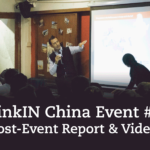 #56 Event Report - China's Maritime Road & the New Centrality of the Mediterranean Speakers Massimo Deandreis General Manager of SRM – Economic Research Center Intesa Sanpaolo Group Wang Lin 王琳 Fellow at CBN research Institute, a think tank on foreign affairs, international finance and global energy. Post-Event Video (If…
#56 Event Report - China's Maritime Road & the New Centrality of the Mediterranean Speakers Massimo Deandreis General Manager of SRM – Economic Research Center Intesa Sanpaolo Group Wang Lin 王琳 Fellow at CBN research Institute, a think tank on foreign affairs, international finance and global energy. Post-Event Video (If…
Read more... -
03 Nov
#55 Event Report – Instability in North Africa and Middle East: A Global Threat?
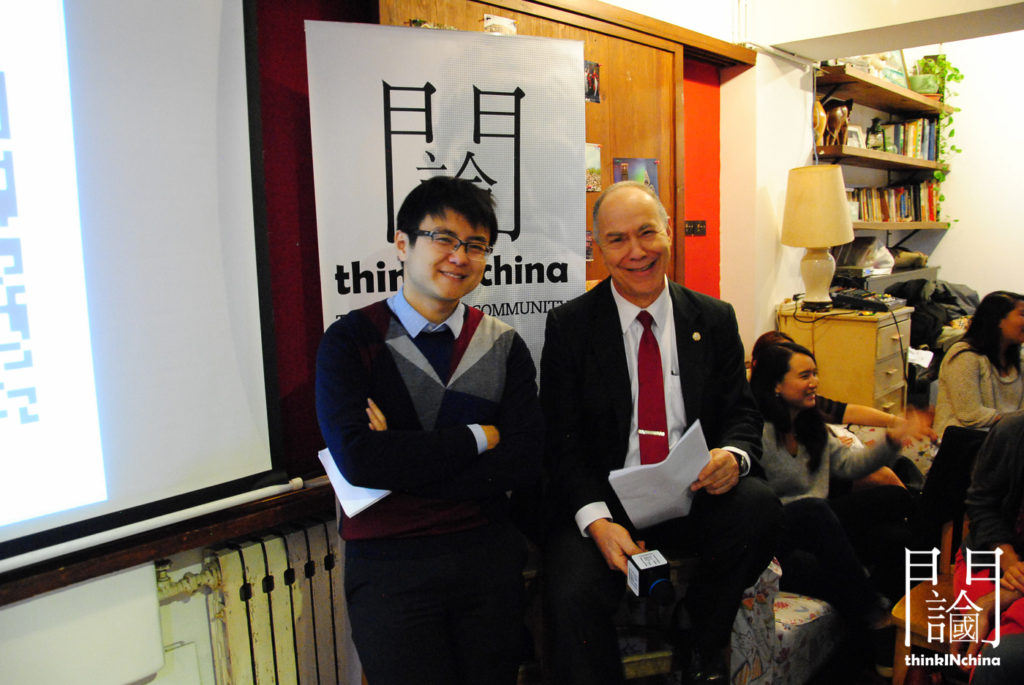
Speakers:
Yahia H. Zoubir, Professor of International Relations & International Management, Director of Research in Geopolitics, Kedge Business School >>Read more…
Gong Zheng 龚正, Assistant Researcher, China Institutes of Contemporary International Relations >>Read more…VIDEO: Prof. Zoubir speaks passionatly post-event on the current trajectory of North Africa
In the evening of 25th of October, ThinkINChina (TIC) was lucky enough to host both Professor Yahia H. Zoubir and Researcher Gong Zheng for an educational, provocative and, above all, exciting whirlwind of a night. And a whirlwind it was.
Prof Zoubir started off by challenging the event’s title: why do Europeans consider ‘stability’ the holiest of holy goods, whilst ‘instability’ seems synonymous with ‘global threats’ and hell itself?
Were the repressive, violent but stable pre-Arab Spring administrations in Tunisia, Egypt and Libya good regimes? Or were they merely considered ‘good’ because European states judged their stable character, useful in creating a buffer zone to what lies south of North Africa?
To answer these questions, Zoubir took us on an analytical journey back to the eve of the Arab Spring: Why did the Arab Spring occur at the time it did? What were the underlying economic, political and social circumstances ignited those events?
In the 1990s stability had been the key word: French president Jacques Chirac had not cared about Tunisia being a police state. Democracy was not important. Feeding your population would do well enough, he said. Northern Mediterranean states actively sponsored those of North Africa. Italian Prime Minister Berlusconi paid General Gaddafi around five billion dollars in reparations: not so Libya would develop its economy, but so they would keep the situation as calm as it was (and provide Italian companies with oil and business in return).
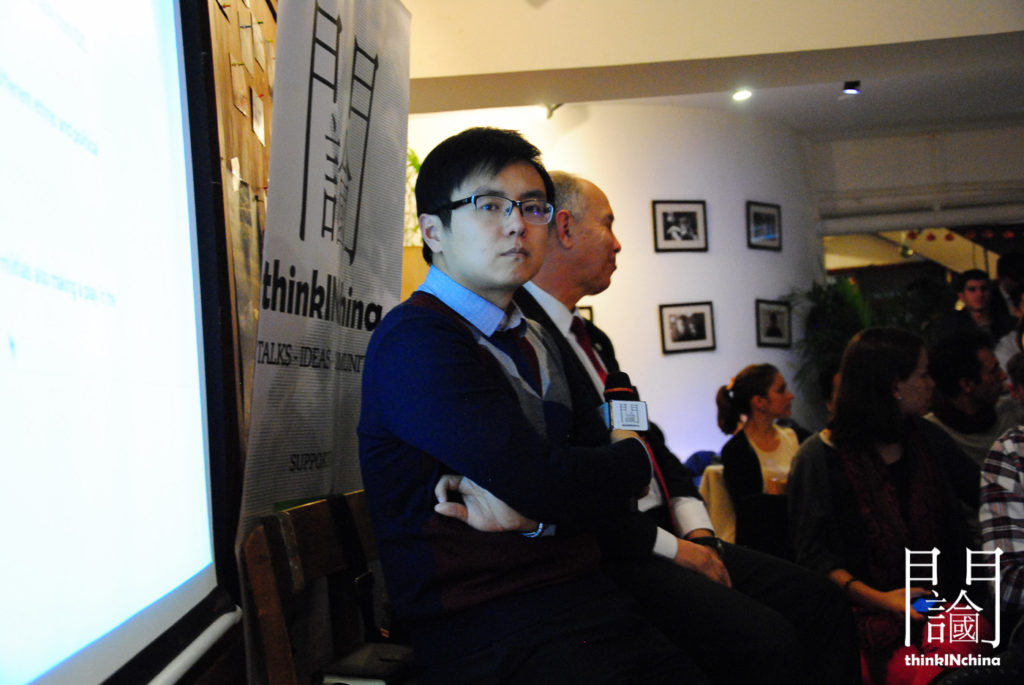
Conjointly, in the 1990s the European states aspired to create a zone of prosperity in North Africa. The strong belief in neoliberal economic served as the motives for the International Monetary Fund to press the countries in the region to privatize and liberalize their economies – with a steady rise of unemployment as a consequence.
Leading up to the Arab Spring, there existed a one to ten wealth gap between the South and North of the Mediterranean.
In Northern African states an economic bourgeoisie came into being, receiving bribes and dividends from multinational companies to do more and more business in these countries. North Africa has a population of which 70% are younger than 35 years old, income inequality is still rising, and unemployment widespread.
The Arab Spring occurred; the regimes first interpreted it as mere ‘food riots’, but, in fact, the causes and grievances were more deep-seated.
Not democracy, but a life of dignity became the recurrent theme in all of these protests.
Some regimes decided to make ‘cosmetic constitutional changes’ whilst remaining in power (Morocco), others gave up power (Tunisia) or droppedtheir plans to have their sons or brother succeed them in office ( Algeria, Egypt), while another was forcibly removed through foreign intervention (Libya).
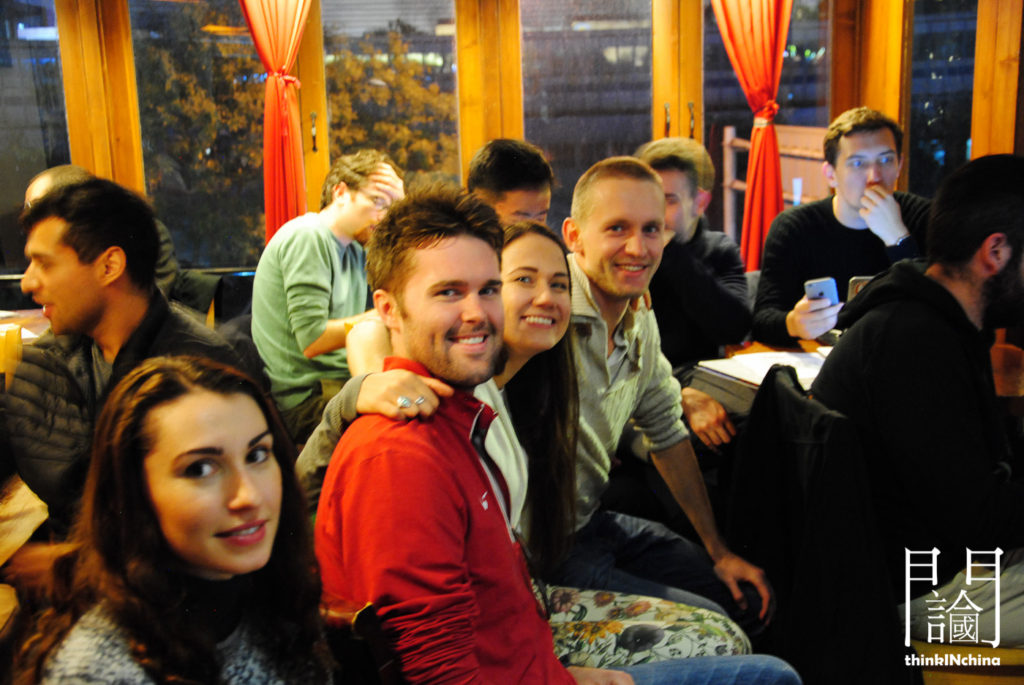
Today, the power vacuum following the intervention in Libya has resulted in civil war and chaos, whose main beneficiaries are the so called Islamic State and other armed groups, thus potentially destabilizing the entire region. Tunisia is reverting to its old system of government as it invests most of its funds in security and building a wall at its border with Libya. Algeria has the same preoccupation at the Libyan border. The Egyptian elected regime was toppled by a military coup. Economic development is lagging in most of North Africa. These states are returning to de facto authoritarian forms of government of the pre-2011 period: repressive, but (not yet) stable.
The chaos in Libya provided these regimes with a new argument to silence their contestation movements even more convincingly: ‘so you want democracy? You truly want to be like Libya eh?’
The lack of development prospects within the current system, and not having any prospect of toppling the said system, leaves disenfranchised youngsters with two choices: either cross the Mediterranean to find an illusory ‘European El Dorado’, or join jihadi groups. Yet, these regimes have again taken up the task the European Union wants them to fulfill: serve as a gate to the states north of the Mediterranean. Hence, providing stability. Zoubir concludes: ‘You cannot fight terrorism if you keep the citizens marginalized because terrorism prospers in areas where young people do not have the prospect of a better tomorrow’. Therefore, supporting regimes that merely provide stability is not a winning strategy.
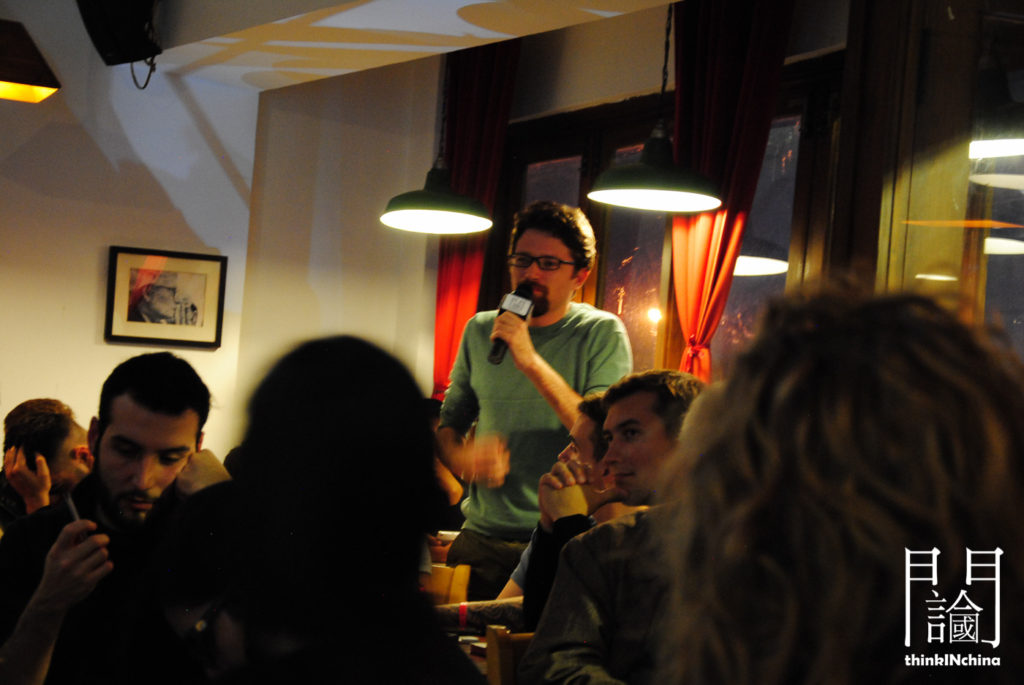
Following Zoubir’s talk, Gong Zheng explored China’s (‘the only big power that has not made big mistakes in the MENA region yet’) concerns and strategies in North Africa and the Middle East. Gong agreed with Zoubir that a lack of focus on the livelihood of local people is one of the main reasons for the prevailing unrest in these states. He referred to the fact that Zhou Enlai had already visited 10 African countries during the Cold War, intending to and succeeding in shaping a close bond between Chinese and African citizens whilst at the same time furthering economic cooperation. Nevertheless China’s political influence has decreased in the region ever since the end of the Cold War.
Gong argues that China does not have a well-designed comprehensive strategy or a sufficient amount of friends in the region whilst it does have interests there, for instance its own domestic stability.
Radicals of China’s Xinjiang province (home of the predominantly Islamic Uyghur community) and foreign Jihadis, well trained and battle hardened in the Middle East and North Africa, have attempted to sneak back into China and commit terrorist attacks in the Eastern part of the country. Moreover, in Northern Mali one Chinese peacekeeper was killed, as were two in South Sudan. This development presents the Chinese government with the following dilemma: on the one hand Beijing does not want to be drawn into the quagmire that is the Middle East and North Africa, yet China does intend to fulfill its international responsibility of providing peacekeepers. Increasingly Chinese citizens do question why Chinese troops are in Mali in the first place, as the instability there is mostly a consequence of (Western) foreign intervention. Shortly, China has more than enough reasons to enlarge its influence in the region.
Although China does have close relations with both the Egyptian and the Algerian administration and has supported the Tunisian peaceful transition of power, the Chinese and the Northern African populations remain largely foreign to each other. Herein lies a clue on what China’s strategy is missing, argues Gong:
China should develop a plan, which aims to comprehend the mind and aspirations of young Northern African people.
As the lack of friendly relations hinders China achieving its foreign policy goals in Middle East and North Africa, such a new public diplomacy push targeted specifically at young people might open up many new opportunities for China in North Africa and the Middle East in the near future.
By Joris Jaap Teer
Related Posts
- 10000
 event #55, Tuesday, October 25th, 2016 SPEAKERS Yahia H. ZOUBIR, Professor of International Relations & International Management, Director of Research in Geopolitics, Kedge Business School GONG Zheng 龚正, Assistant Researcher, China Institutes of Contemporary International Relations ABSTRACT Five years after the start of the so-called Arab Spring in North Africa, the…
event #55, Tuesday, October 25th, 2016 SPEAKERS Yahia H. ZOUBIR, Professor of International Relations & International Management, Director of Research in Geopolitics, Kedge Business School GONG Zheng 龚正, Assistant Researcher, China Institutes of Contemporary International Relations ABSTRACT Five years after the start of the so-called Arab Spring in North Africa, the… - 10000
 Following his outstanding talk at ThinkIN China #55, Professor Zoubir gave us this brilliant, impassioned appraisal of the situation in North Africa. Photos from the event are up on our Facebook page. Stay tuned this week for more coverage of our recent events, including the podcast and full event report…
Following his outstanding talk at ThinkIN China #55, Professor Zoubir gave us this brilliant, impassioned appraisal of the situation in North Africa. Photos from the event are up on our Facebook page. Stay tuned this week for more coverage of our recent events, including the podcast and full event report… - 10000October 25th, 2016 Instability in North Africa and Middle East: a global threat? Supplementary material Zoubir, Yahia H. 2012. Qaddafi's spawn. What the dictator's demise unleashed in the Middle East. Foreign Affairs, available here Zoubir, Yahia H. 2012. The Sahara-Sahel Quagmire: Regional and International Ramifications. Mediterranean Politics, 17:3, 452-458.…
- 10000
 Yahia H. ZOUBIR, Professor of International Relations & International Management, Director of Research in Geopolitics, Kedge Business School Dr. Yahia H. Zoubir is Professor of International Relations and International Management, and Director of Research in Geopolitics at KEDGE Business School, Marseille, France and currently Visiting Professor at PKU. Prior…
Yahia H. ZOUBIR, Professor of International Relations & International Management, Director of Research in Geopolitics, Kedge Business School Dr. Yahia H. Zoubir is Professor of International Relations and International Management, and Director of Research in Geopolitics at KEDGE Business School, Marseille, France and currently Visiting Professor at PKU. Prior… - 10000
 GONG Zheng 龚正, Assistant Researcher, China Institutes of Contemporary International Relations Gong Zheng us an assistant researcher of the Institute of Middle East Studies at China Institute of Contemporary International Relations (CICIR). He joined CICIR in 2011, focusing on Israel-Palestiniana relations, Syrian crisis, the politics of Jordan and Lebanon.…
GONG Zheng 龚正, Assistant Researcher, China Institutes of Contemporary International Relations Gong Zheng us an assistant researcher of the Institute of Middle East Studies at China Institute of Contemporary International Relations (CICIR). He joined CICIR in 2011, focusing on Israel-Palestiniana relations, Syrian crisis, the politics of Jordan and Lebanon.…
Read more... -
31 Oct
#55 – Post Event Video
Following his outstanding talk at ThinkIN China #55, Professor Zoubir gave us this brilliant, impassioned appraisal of the situation in North Africa.
Photos from the event are up on our Facebook page.
Stay tuned this week for more coverage of our recent events, including the podcast and full event report for ThinkIN China #55.
Related Posts
- 10000
 event #55, Tuesday, October 25th, 2016 SPEAKERS Yahia H. ZOUBIR, Professor of International Relations & International Management, Director of Research in Geopolitics, Kedge Business School GONG Zheng 龚正, Assistant Researcher, China Institutes of Contemporary International Relations ABSTRACT Five years after the start of the so-called Arab Spring in North Africa, the…
event #55, Tuesday, October 25th, 2016 SPEAKERS Yahia H. ZOUBIR, Professor of International Relations & International Management, Director of Research in Geopolitics, Kedge Business School GONG Zheng 龚正, Assistant Researcher, China Institutes of Contemporary International Relations ABSTRACT Five years after the start of the so-called Arab Spring in North Africa, the… - 10000October 25th, 2016 Instability in North Africa and Middle East: a global threat? Supplementary material Zoubir, Yahia H. 2012. Qaddafi's spawn. What the dictator's demise unleashed in the Middle East. Foreign Affairs, available here Zoubir, Yahia H. 2012. The Sahara-Sahel Quagmire: Regional and International Ramifications. Mediterranean Politics, 17:3, 452-458.…
- 10000Speakers: Yahia H. Zoubir, Professor of International Relations & International Management, Director of Research in Geopolitics, Kedge Business School >>Read more... Gong Zheng 龚正, Assistant Researcher, China Institutes of Contemporary International Relations >>Read more... VIDEO: Prof. Zoubir speaks passionatly post-event on the current trajectory of North Africa In the evening…
- 10000
 Yahia H. ZOUBIR, Professor of International Relations & International Management, Director of Research in Geopolitics, Kedge Business School Dr. Yahia H. Zoubir is Professor of International Relations and International Management, and Director of Research in Geopolitics at KEDGE Business School, Marseille, France and currently Visiting Professor at PKU. Prior…
Yahia H. ZOUBIR, Professor of International Relations & International Management, Director of Research in Geopolitics, Kedge Business School Dr. Yahia H. Zoubir is Professor of International Relations and International Management, and Director of Research in Geopolitics at KEDGE Business School, Marseille, France and currently Visiting Professor at PKU. Prior… - 10000
 GONG Zheng 龚正, Assistant Researcher, China Institutes of Contemporary International Relations Gong Zheng us an assistant researcher of the Institute of Middle East Studies at China Institute of Contemporary International Relations (CICIR). He joined CICIR in 2011, focusing on Israel-Palestiniana relations, Syrian crisis, the politics of Jordan and Lebanon.…
GONG Zheng 龚正, Assistant Researcher, China Institutes of Contemporary International Relations Gong Zheng us an assistant researcher of the Institute of Middle East Studies at China Institute of Contemporary International Relations (CICIR). He joined CICIR in 2011, focusing on Israel-Palestiniana relations, Syrian crisis, the politics of Jordan and Lebanon.…
Read more... -
14 Oct
Podcast #55 – INSTABILITY IN NORTH AFRICA AND MIDDLE EAST: A GLOBAL THREAT?
Podcast
Related Posts
- 10000
 event #55, Tuesday, October 25th, 2016 SPEAKERS Yahia H. ZOUBIR, Professor of International Relations & International Management, Director of Research in Geopolitics, Kedge Business School GONG Zheng 龚正, Assistant Researcher, China Institutes of Contemporary International Relations ABSTRACT Five years after the start of the so-called Arab Spring in North Africa, the…
event #55, Tuesday, October 25th, 2016 SPEAKERS Yahia H. ZOUBIR, Professor of International Relations & International Management, Director of Research in Geopolitics, Kedge Business School GONG Zheng 龚正, Assistant Researcher, China Institutes of Contemporary International Relations ABSTRACT Five years after the start of the so-called Arab Spring in North Africa, the… - 10000October 25th, 2016 Instability in North Africa and Middle East: a global threat? Supplementary material Zoubir, Yahia H. 2012. Qaddafi's spawn. What the dictator's demise unleashed in the Middle East. Foreign Affairs, available here Zoubir, Yahia H. 2012. The Sahara-Sahel Quagmire: Regional and International Ramifications. Mediterranean Politics, 17:3, 452-458.…
- 10000Speakers: Yahia H. Zoubir, Professor of International Relations & International Management, Director of Research in Geopolitics, Kedge Business School >>Read more... Gong Zheng 龚正, Assistant Researcher, China Institutes of Contemporary International Relations >>Read more... VIDEO: Prof. Zoubir speaks passionatly post-event on the current trajectory of North Africa In the evening…
- 10000
 Following his outstanding talk at ThinkIN China #55, Professor Zoubir gave us this brilliant, impassioned appraisal of the situation in North Africa. Photos from the event are up on our Facebook page. Stay tuned this week for more coverage of our recent events, including the podcast and full event report…
Following his outstanding talk at ThinkIN China #55, Professor Zoubir gave us this brilliant, impassioned appraisal of the situation in North Africa. Photos from the event are up on our Facebook page. Stay tuned this week for more coverage of our recent events, including the podcast and full event report…
Read more... -
29 Sep
#54 Event Report – The Future of Sino-Russian Energy Ties
September 21st, 2016. The Bridge Café (Wudaokou).
Speaker: WANG Tao, Assistant Director, Yicai Research Institute; Nonresident Scholar, Carnegie-Tsinghua Center for Global Policy.
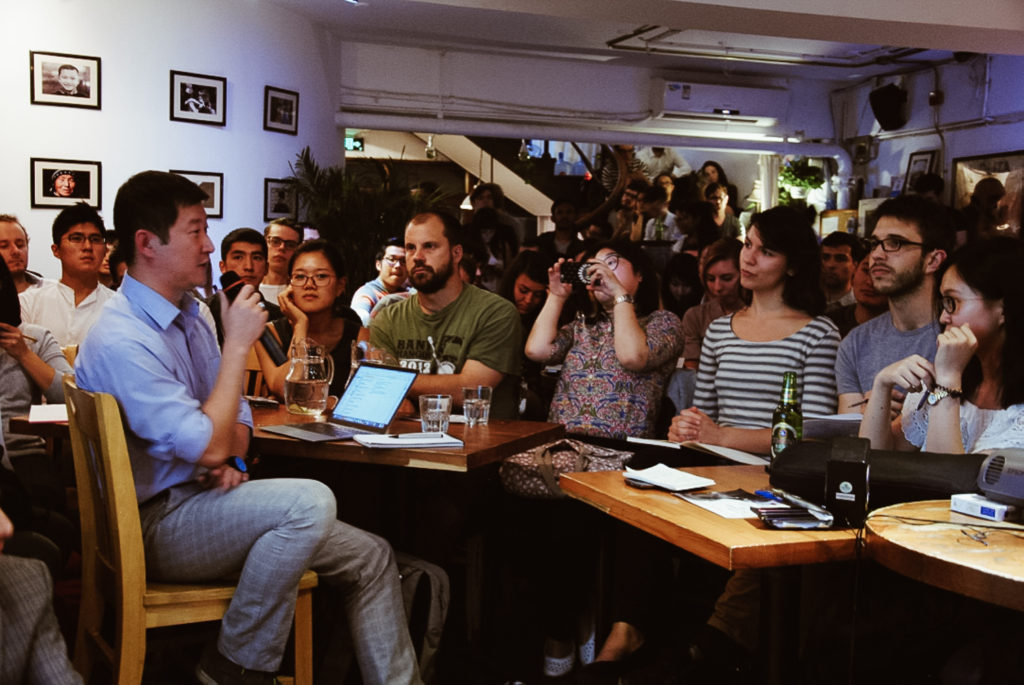 Wang Tao addresses the audience at ThinkInChina #54
Wang Tao addresses the audience at ThinkInChina #54China and Russia: ‘Not yet an alliance’
‘There is some type of partnership between Russia and China, but not yet an alliance’.
With this strong statement, we can start to consider why the two countries, so geographically close, are cooperating on energy issues. Historically, Russia and China don’t have a very good relationship. They are two players who ‘don’t really know each other that much’, so the negotiations to an energy deal were probably going to lead to some problems.
In 2008, right before the economic crisis, oil prices had reached a record high, but by the end of the year, there was a significant fall. The first big oil deal between China and Russia happened in 2009, soon after the world economy had just collapsed, heavily affecting Russian economy. Meanwhile, China’s energy demand was rocketing and the most pressing issue was finding a reliable oil supply. At the time, there was little media attention to the deal, since the majority of oil imported by China was still coming from the Middle East (mainly Iran). The deal seemed like one of the many others China had signed with oil nations, and it also included the creation of a pipeline from East Siberia to the Pacific Ocean.The road to the 2014 deal
Two events helped creating the path for the huge deal closed in 2014 between China and Russia. The first one was in 2013, when air pollution levels reached record highs in Beijing, creating a lot of pressure for the government to replace the usage of coal with natural gas.
Natural gas had been on the talks between China and Russia for quite some time, as Russia is one of the world’s largest producers, and it sits so close to China. However, an agreement on price couldn’t be reached beforehand, as Russia wanted to charge the same price paid by the European Union (which has a far greater demand than China). Although natural gas is produced in China, it’s has very limited production and distribution.
As the Chinese government got serious about natural gas, Central Asia was seen as an alternative in case a deal with Russia didn’t work out. Such was the cases that Turkmenistan, looking for diversification, now has three pipelines going to China.
The second event was in 2014, when with the Ukraine crisis, there was a major change as Russian relations with the European Union fell apart and sanctions ensued. It was time for Russia to look east, especially Japan and South Korea, searching for new markets as insecurity about supply (which goes to and through Ukraine) preoccupied buyers and sellers alike. Therefore, Chinese and Russians had substantial reasons to close the deal. The frustrations from 2009 were gone and they agreed on a final price (secret, as it is considered a national security issue).A public friendship becomes present in the media and encouraged by both governments.
 Wang Tao smiles for the camera before his ThinkInChina address
Wang Tao smiles for the camera before his ThinkInChina addressBumps on the road: oil prices and Chinese economy
The falling oil prices in 2014 ended up affecting the deal and slowing down on some of the initiatives. As extracting oil can be very costly depending on geography and technology, a few oil-producing nations with more fragile economies suffered heavily, such as Russia, Nigeria, and Venezuela to keep profits. In this scenario, natural gas directly competes with oil, as Japan is more willing to pay Russia a higher price than China for the gas. Since the oil crisis in 1973, Japan has had a policy of replacing oil with natural gas for generating power.In this context, China started to reconsider if it should go on with the planned deal.
As China’s economy slows down, the country will stop being the major driver of an increased demand for oil, as it has been for the past 20 years. The Chinese economy is restructuring and the ‘new normal’ has not been found yet. At the same time, there has been a heavy promotion of new and renewable energies, with billions invested in electric cars, for instance.
Renewable energy is seen as strategic, due to technology development, security, and air quality.
Therefore, in the long term, China might not need oil and natural gas as much as predicted.
Trends in 2016
There has been an increase in Chinese import of oil in early 2016, but they are only temporary. The first one was the strategic reserves slowing down along with lower oil prices fueling more imports, and the second are the new policies regarding private refineries in China. With ¼ of Chinese capacity, the private refineries (or ‘teapots’) were not allowed to import crude oil, having to rely on dirtier types of the product. Last year, the government lifted this restriction, allowing them to import the heavier type of crude. These refineries – sometimes poorly regulated and with low efficiency – are now the major drivers of Russia’s oil exports to China. However, the demand is likely to go down soon, as heavy industries will suffer with an economic slowdown.
As Saudi Arabia has been competing with Russia to supply the Chinese market is important to pay attention to the developments in future OPEC meetings.
Final thoughts
It seems the balance in the negotiations is now leaning towards China, especially as most Russia and Central Asia nations need Chinese investment in the oil sector. Although there is an imbalanced relationship now, there are still reasons for the partnership to continue.
As the tension in the South China Sea steadily increases and a peaceful conclusion is unlikely, a strong partnership with Russia could be helpful.
Besides that, relying on the Malacca Strait for oil supply is dangerous, so a different route from land is very important for the Chinese government.
Their mutual interest in Central Asia is also a common issue. Russia still sees Central Asia as its backyard, but can see the need for Chinese presence (and money) in the region. Moscow can help Chinese investment by providing security to deals already made and guaranteeing regimes will maintain their promises, even if the government changes.
Finally, it is clear there are uncertainties about China’s needs, as the economy slows down and the usage of renewable energy goes up. At the same time, Russia still sees itself as a European country. Although we can see a friendliness in the short term, there is still a lack of trust between both countries.Q&A
As many doubts remain on the strength of this relationship, Mr Wang was asked several questions regarding a potential friendship between Xi Jinping and Vladimir Putin? His response; probably not a friendship, but a very important part of international relations is the relationship between world leaders. Xi and Putin meet each other very frequently and this could indicate they have found common ground to discuss. They definitely understand each other.
Regarding other alternatives for China, Mongolia was mentioned as an interesting partner, similar to Central Asia nations, but more under the influence of China than Russia and in need of investments. Also, Myanmar, as a different route from the Malacca Strait. Japan’s role was also part of the discussion, as the pipelines will not end in China, because Russia is also looking for diversification. As Northeast China suffers with the economy, the new pipelines projected for the area might not come true due to low demand. If Russia decides to use Japan as a bargaining chip for the deal, it would be very problematic for the Chinese government.
China and Russia are still not dependent on each other in their respective energy balances, so it is sensible to think of diversification. The trust between them needs to be improved through understanding, but both countries suffer from lack of transparency and poor interpretation of their actions and inner workings. There have been understanding between governments when it comes to Central Asia, though, as the Eurasian Economic Union and the ‘One Belt, One Road’ (OBOR) initiatives integrated their projects earlier this year.
There is also the important topic of physical infrastructure and the role of the AIB (Asian Infrastructure Bank). The AIB and the OBOR are excellent ideas, but it remains the question of how are going to be the returns on Chinese investment and expectations in the region. Two points were overlooked by Beijing: the poor government regulations in Central Asia and their severe lack of infrastructure.Could Shanghai become an energy hub for natural gas? Maybe, but China is still lagging behind Singapore. It needs to allow for more transparency and lower regulations on price (more free trade). There is still a big monopoly of state companies and liberalizing is a necessity, as soon as the conversations about this topic return (when oil prices increase again).
Written by Julia Rosa
Related Posts
- 10000
 WANG Tao 王韬 Assistant Director, Yicai Research Institute; Nonresident Scholar, Carnegie-Tsinghua Center for Global Policy Dr. Tao Wang has been the Assistant Director of CBNRI since January 2016, heading the Institute’s energy research program and Beijing office. Dr. Wang along with his team seeks to provide independent, objective, and insightful suggestions…
WANG Tao 王韬 Assistant Director, Yicai Research Institute; Nonresident Scholar, Carnegie-Tsinghua Center for Global Policy Dr. Tao Wang has been the Assistant Director of CBNRI since January 2016, heading the Institute’s energy research program and Beijing office. Dr. Wang along with his team seeks to provide independent, objective, and insightful suggestions… - 10000
 event #54, Wednesday, September 21st, 2016 Speaker WANG Tao, 王韬 Assistant Director, Yicai Research Institute; Nonresident Scholar, Carnegie-Tsinghua Center for Global Policy. ABSTRACT China used to call Russia, or the former USSR, the “Old Brother”, but not anymore. The most recent self-claimed title of Russia is an “Elder Sister” of…
event #54, Wednesday, September 21st, 2016 Speaker WANG Tao, 王韬 Assistant Director, Yicai Research Institute; Nonresident Scholar, Carnegie-Tsinghua Center for Global Policy. ABSTRACT China used to call Russia, or the former USSR, the “Old Brother”, but not anymore. The most recent self-claimed title of Russia is an “Elder Sister” of… - 10000September 21st, 2016 The Future of Sino-Russian Energy Ties Supplementary material Wang, Tao and Rachel Yampolsky. 2015. Will China and Russia's Parternship in Central Asia Last? The Diplomat, available here Gabuev, Alexander and Greg Shtraks. 2016. China's One Belt, One Road Initiative and the Sino-Russian Entente. National Bureau…
Read more...




